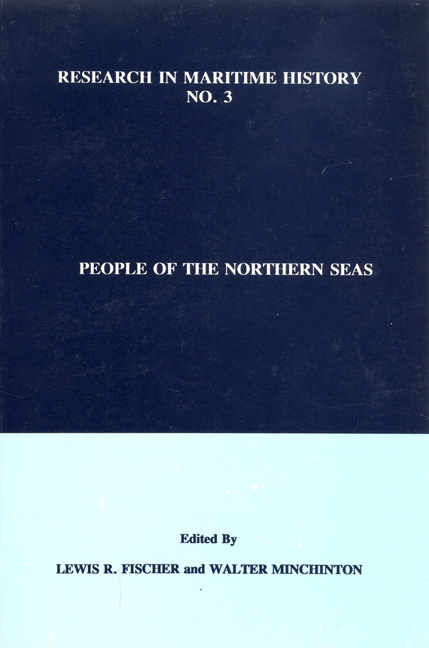Book contents
- Frontmatter
- Contents
- About the Editors
- Contributors
- General Introduction
- “Une Petite Republique” in Southwestern Newfoundland: The Limits of Imperial Authority in a Remote Maritime Environment”
- “Changes in Aleut Communities Following Russian Contact”
- “Five Years Before the Mast: Observations on the Conditions of Maritime Labour in Finland and Elsewhere”
- “Expressions of Longing, Sources of Anxiety? The Significance of Contacts with Home for Finnish Sailors in London and Hull in the Late Nineteenth Century”
- “Death of a Merchant”
- “St. Petersburg's Bills of Exchange in the Russian Economy of the Eighteenth Century”
- “Shipowners and Iron Sailing Ships: The First Twenty Years, 1838-1857”
- “The Growth of Norwegian Shipbroking: The Practices of Fearnley and Eger as a Case Study, 1869-1914”
- “Captain John Deane: Mercenary, Diplomat and Spy”
- “Her Majesty's Coastguard”
- “Coastal Life, ‘Nordic Culture’ and Nation State: Reflections on the Formation of the Nation State and Maritime History”
“The Growth of Norwegian Shipbroking: The Practices of Fearnley and Eger as a Case Study, 1869-1914”
- Frontmatter
- Contents
- About the Editors
- Contributors
- General Introduction
- “Une Petite Republique” in Southwestern Newfoundland: The Limits of Imperial Authority in a Remote Maritime Environment”
- “Changes in Aleut Communities Following Russian Contact”
- “Five Years Before the Mast: Observations on the Conditions of Maritime Labour in Finland and Elsewhere”
- “Expressions of Longing, Sources of Anxiety? The Significance of Contacts with Home for Finnish Sailors in London and Hull in the Late Nineteenth Century”
- “Death of a Merchant”
- “St. Petersburg's Bills of Exchange in the Russian Economy of the Eighteenth Century”
- “Shipowners and Iron Sailing Ships: The First Twenty Years, 1838-1857”
- “The Growth of Norwegian Shipbroking: The Practices of Fearnley and Eger as a Case Study, 1869-1914”
- “Captain John Deane: Mercenary, Diplomat and Spy”
- “Her Majesty's Coastguard”
- “Coastal Life, ‘Nordic Culture’ and Nation State: Reflections on the Formation of the Nation State and Maritime History”
Summary
In the past quarter-century our understanding of important aspects of nineteenth-century maritime history has improved dramatically. We know far more than before about topics such as the development of national fleets, the individuals who invested in them, the trades they plied, and the seamen who manned them. Scholars are even starting to examine the communities which spawned maritime actors and to situate their studies in the national societies and economies of which they were a part. Moreover, research is beginning to appear that analyses shipping comparatively within its international context. Yet there remain significant gaps in our knowledge. This generalisation is particularly apposite to those we might call “maritime middlemen,” those intermediaries between buyers and sellers of shipping services. One of the occupations about which our comprehension is less than adequate is shipbroking. Virtually the entire literature on the historical development of this profession is in the form of either popular studies or commissioned histories on individual firms, most of which fail to meet the standards of professional scholarship. And even within this limited body of writing, almost nothing has been written about non-British brokers Indeed, even in Norway, a nation with a significant tradition of maritime scholarship, our ignorance is equally profound: the literature on this occupation is confined to only a few inadequate studies.
Yet if there is a void in our comprehension of shipbroking firms, the literature is even more barren when it comes to examinations of the actual practice of broking. Indeed, the format most favoured by business historians-to describe and explain the success or failure of an individual enterprise—is part of the problem. From these studies a reader can learn a good deal about the experiences of a specific company but will find it next to impossible to gain an understanding of the development of the profession itself. While we make no pretext of breaking out of this paradigm completely—it is too early in our study for that and the secondary literature is too inadequate to support such aspirations—we do make a preliminary attempt to redress the problem. Although most of the evidence in this paper derives from an examination of a single firm, we try to shift the focus in two ways.
- Type
- Chapter
- Information
- People of the Northern Seas , pp. 135 - 156Publisher: Liverpool University PressPrint publication year: 1992



